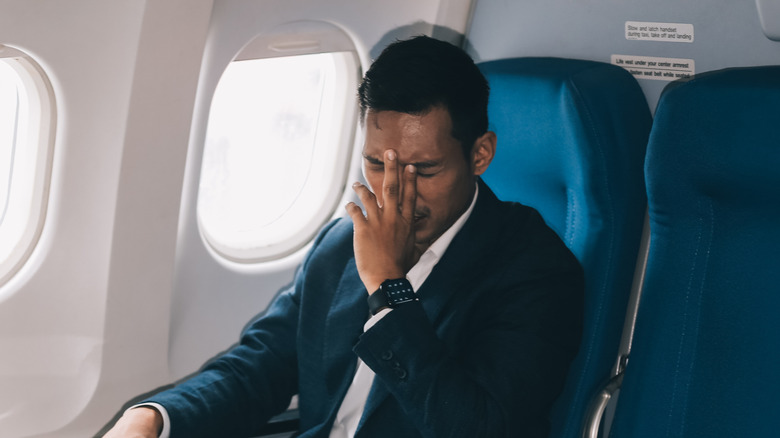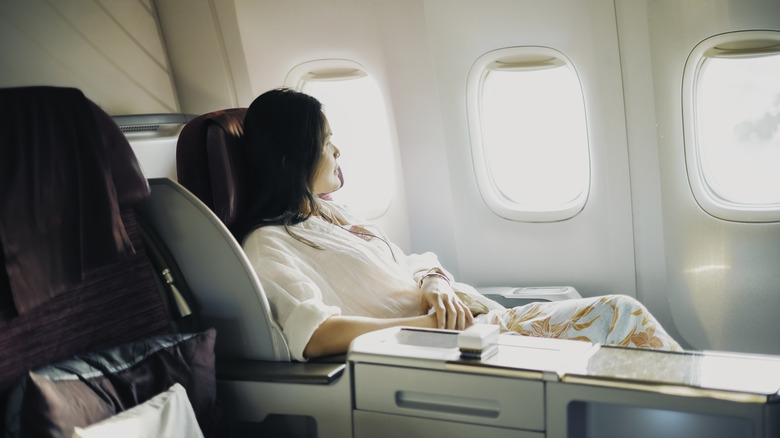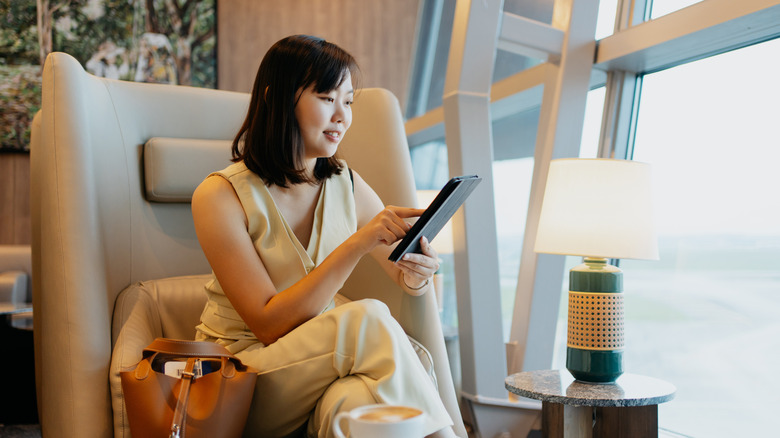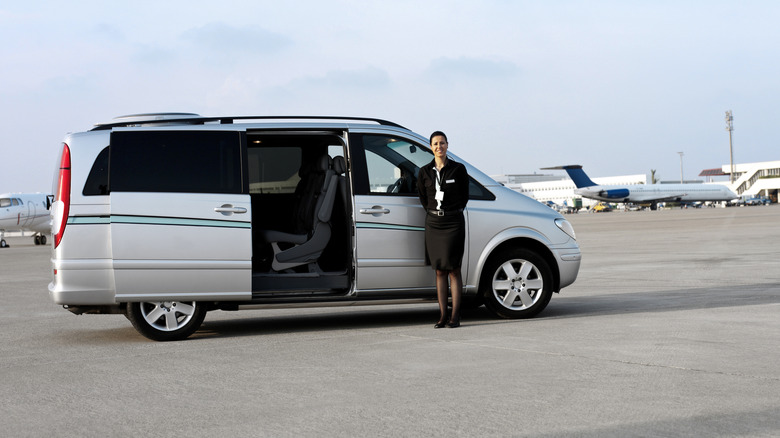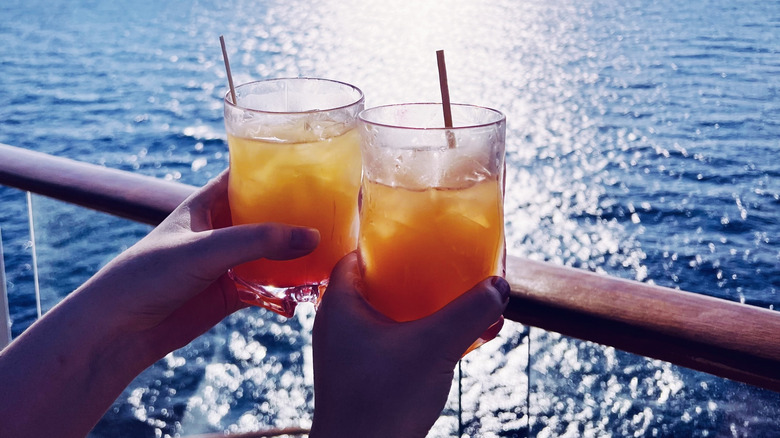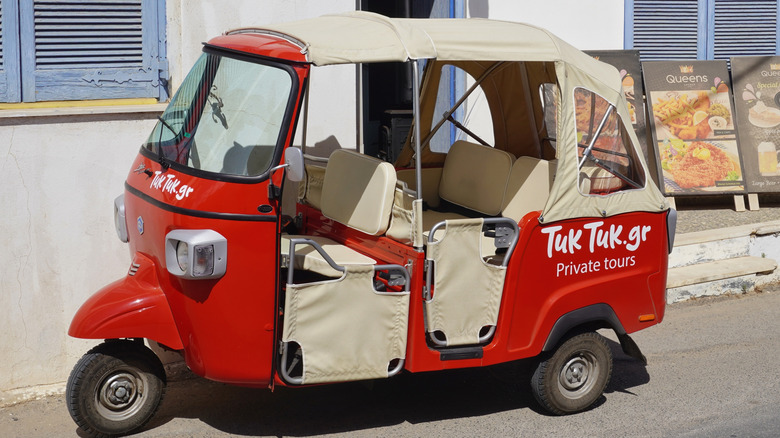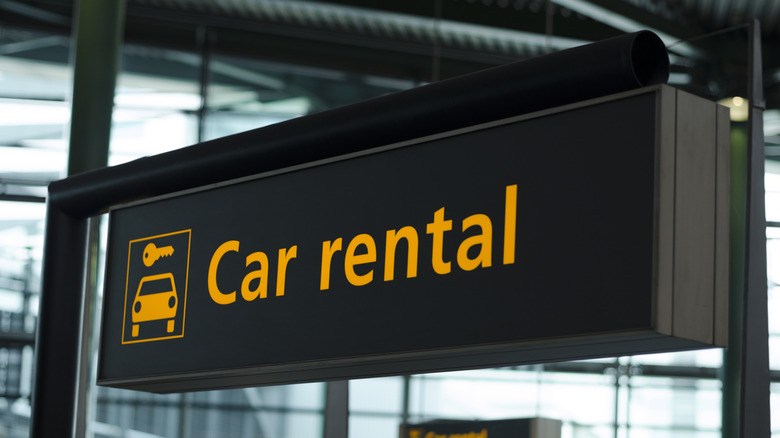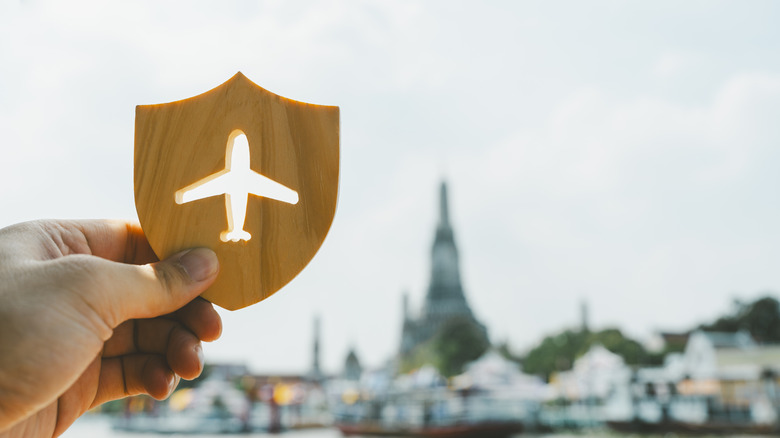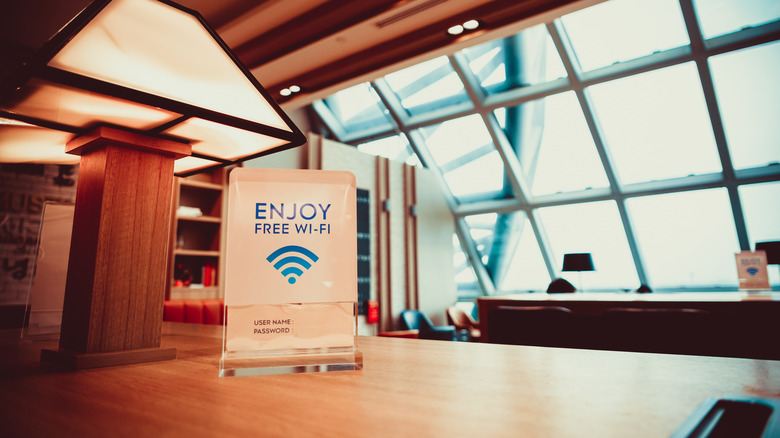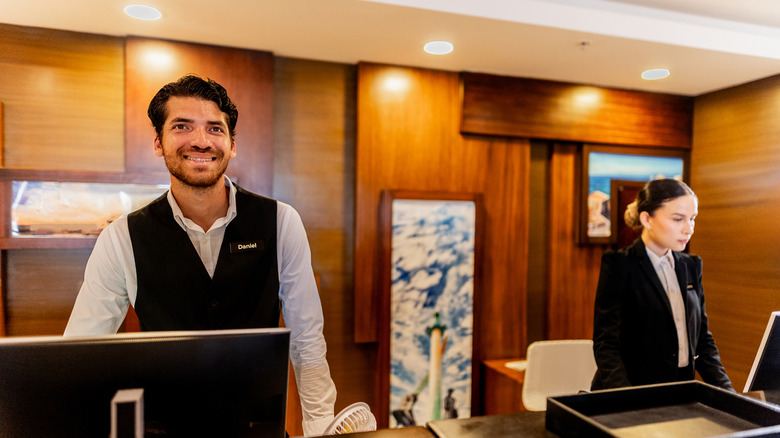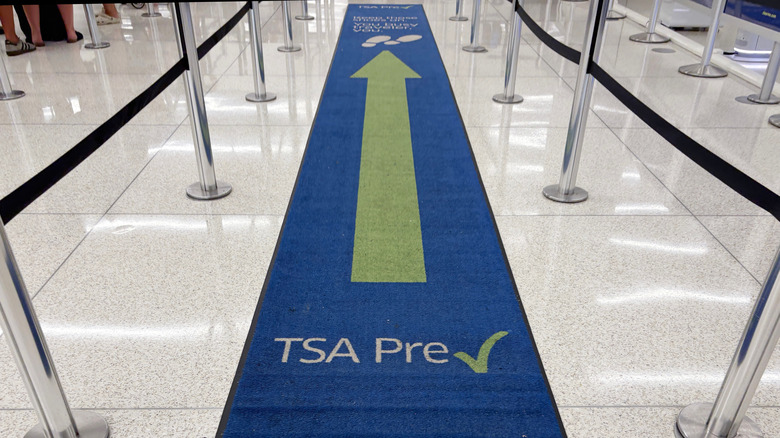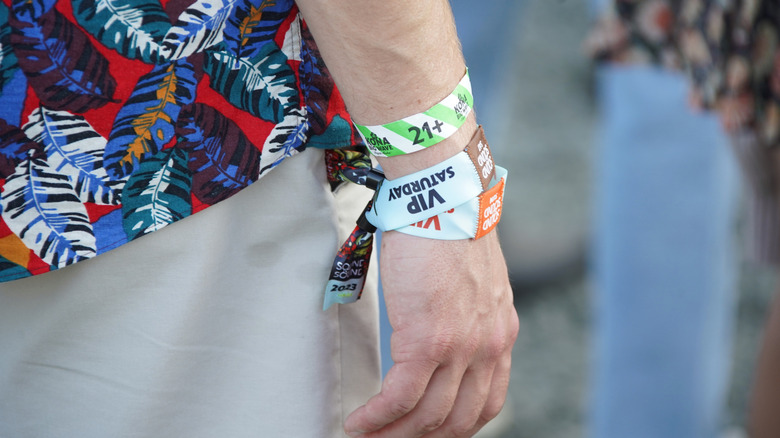You've Been Warned: These Travel Upgrades Are A Total Waste Of Money
Travel isn't cheap, but the cost is worth it for the more than 312 million Americans planning to hit the road in 2025. While most people stick within the United States' borders, an impressive 100 million Americans travel abroad yearly. The trick to keeping travel expenses reasonable is finding that perfect balance between spending what you need to have a safe, memorable, and enjoyable experience, while avoiding unnecessary or overpriced extras. According to Motley Fool, the average person spends around $7,249 for a vacation.
Everyone who's been outside of their hometown can attest to how quickly the budget can get out of hand without diligent oversight and careful spending. One of the best ways to rein in frivolous spending is to avoid paying for pointless upgrades. When you're meticulously planning your trip, it's easy to avoid exorbitant fees and unnecessary extras. Aware of this hesitancy upfront, travel providers have developed a strategy of offering upgrades to increase their profit margins.
These extras are usually presented as a last-minute addition, forcing you to decide on the spot. If you're rushing to catch a flight, eager to check into a hotel, or tired after a long travel day, you're more likely to agree to an unwarranted upgrade that you don't want or, even worse, can't afford. One of the top strategies to tackle impulse spending while traveling is to be aware of these tactics in the first place. Keep an eye out for these travel upgrades that are a total waste of money.
More expensive seats
It's tough to resist the temptation of a seat upgrade when confronted with a potentially uncomfortable journey. That extra leg room, additional padding, larger tray table, and quieter area might all sound persuasive at the time, but it's not always worth dramatically increasing the price of your ticket. Depending on the airline and specific flight, business class seats can cost five times more than standard economy. Of course, the price difference won't be as egregious on more affordable forms of transportation, but the same principle applies: A seemingly harmless upgrade can upend your travel budget. Plus, it's tough to justify their cost if you're on a short-haul flight, regional bus, or quick train ride. You simply don't have sufficient time to enjoy all of the perks offered with an upgraded seat on a short-distance trip.
Besides, you can achieve many of the same advantages through a little prep work. A cheap neck pillow and a lower lumbar support cushion can transform any stiff-as-a-board seat into one you never want to leave. Noise-canceling headphones can give you that first-class peace and solitude, no matter what's going on around you. If you're on a form of transportation with a common area, such as a dining cart in a train or a bar in a large aircraft, make use of the accommodations. The less time you spend actually sitting down, the less the quality of the seat matters.
Airport lounges
Airports are notoriously uncomfortable and uninviting, with passengers faced with cramped spaces, awkward seats, overpriced food, and strange smells. When you're stuck in the midst of this unpleasantness for hours before a flight, airport lounges can seem like paradise. You've got comfortable seating, less crowded areas, food, drinks, and private bathrooms — sometimes even with showers. Bear in mind that airlines know exactly what they're doing when offering this upgrade. Airport lounges prey on passengers stuck in intolerable and stuffy airports, and the costs reflect that predatory angle. Delta, United, and American Airlines charge $695, $750, and $850, respectively, for annual passes.
Many airlines don't allow for one-time passes to push passengers toward their annual payment schemes. Unless you travel routinely for work, these are a completely unnecessary expense. Most people aren't even at airports for longer than two hours — barring a significant delay — meaning airport lounge offerings can't be fully enjoyed. You're much better off putting a fraction of that money towards making your stay in the general part of the airport more comfortable. That could mean buying a tasty, warm meal or grabbing a thirst-quenching drink. Simply wandering around for a bit to find a less crowded and more comfortable spot can whisk away any temptation to cough up the extortionate rates of airport lounges. If you're desperate for access, consider purchasing a Priority Pass — a membership that gives you access to 1,400 lounges across the world.
Private transportation
It doesn't matter if you're taking a bus across a city or a train throughout a country, public transportation never fails to cause some reservations or distress. While incredibly convenient and unbeatably affordable, these forms of public transit often come with some admitted downsides, such as flocks of people, grittiness, and occasional safety concerns. These considerations can make even the most frugal traveler think about hiring a private driver. The convenience, comfort, and speed of private options can seem to justify their high costs in the moment, but try to think about the pang you'll feel when reviewing your travel expenses. A chauffeur can cost anywhere between $60 and $300 per hour, depending on the location, distance, and vehicle type. For example, a standard sedan usually falls within the $60 to $100 per hour range, while vans or SUVs could stretch up to $75 or $150 per hour or even higher.
If public transportation isn't an option where you're traveling or you feel the situation is too risky, consider taking an Uber, Lyft, or other form of ridesharing before hiring a private transportation service. These apps provide rating systems, safety checks, and other precautionary measures to keep passengers safe while charging far less than a private chauffeur. Travelers tend to receive offers for private transportation when booking accommodations and activities, so be on guard. Providers usually make the offer nonchalantly, hoping you don't ask how much it costs extra.
Cruise beverage package
Cruises are often heralded as the ultimate all-inclusive way to travel, offering budget-conscious vagabonds a way to see the world without breaking the bank. While cruises can represent a cheap holiday option by ingeniously combining transportation and sightseeing, they're not without hidden and costly upgrades. Instead of allowing passengers to bring their own drinks on board or having them pay piecemeal, cruise companies often offer drink packages. These deals give passengers unlimited access to as many drinks as they want for a set fee. Drink packages are limited to a certain period, usually a day, although some last the duration of a trip. Unless you plan on consuming an unhealthy amount of liquor, these cruise drink packages are almost certainly a waste of hard-earned travel money.
Every cruise line sets different prices for beverage packages, but they're all significantly expensive. Carnival Cruise offers an all-inclusive drink pass for $60 per day, one of the more reasonable options. Holland America and Royal Caribbean charge passengers $90 and $100 per day, respectively, for unlimited access to drinks. While it might not sound like that bad of a deal, these drink packages often come with stipulations and restrictions despite their advertisement as "unlimited" or "all-inclusive." Often, this fine print requests everyone in the room to buy the package and sets a ceiling on individual drink prices. Before you buy, take a second to do the math. Look at the cost for a single drink on the cruise and see how much you'd likely spend based on how much you consume. There's a good chance the total cost is much lower than the drink package offered on the cruise.
Private or custom tours
Tours are a popular activity when traveling. Whether you're visiting a new place in the U.S. or exploring a foreign country, a tour is a fantastic way to get more familiar with the location. You can find a tour for virtually anything, including city walking tours, museum and art tours, and even nature tours. While the initial cost of a tour may seem reasonable and worthwhile, keep an eye out for expensive add-ons. Many tour providers attempt to upsell tourists by offering private or custom packages. The main selling points of these tours are having more control over the itinerary, getting more attention from the guide, and avoiding large tour groups.
Private and customizable tours could be tempting, but they're often overpriced compared to what you get in a small, organized tour. At the end of the day, you're going to see the same things and receive the same information no matter how many people join. Regardless, going on a group tour is one of the best ways to meet new people when traveling. If you want the best of both worlds, book group tours early in the morning or during off-season periods. This way, the smaller groups will grant you a more intimate experience with the guide and offer you more sway over the direction of the tour.
Car rental add-ons
When you head to the rental desk to pick up a vehicle, you'll most likely be met with an opportunity to upgrade your booking. Don't fall for the appeal of a "nicer" or "premium" vehicle. There's a reason you chose the car you did when you were booking your vacation. Unless something significant changed, such as somebody else joining your vacation or a new plan to drive on challenging terrain, you're perfectly fine with your current option. Beyond encouraging drivers to upgrade to more expensive cars, rental companies also offer various add-ons with the promise of a smoother, more enjoyable vacation.
One of the most common extras is a GPS. In reality, most vehicles already have this technology built in, making the purchase unnecessary. Plus, you can use your smartphone for directions, unless you're heading into territory with limited cell reception. Another common car rental extra is a toll package wherein the provider offers to handle the toll expenses on your behalf. While this service is undeniably convenient, it's also sneakily expensive. Rental car companies charge flat fees along with other hidden expenses. You'll save more money by avoiding toll roads or simply paying yourself. Yet another costly upgrade that's potentially unnecessary is car rental insurance. Most Mastercard and Visa credit card holders already have some protection when renting a car with a specific card. This is one of the little-known credit card perks you should be taking advantage of.
Most extensive insurance coverage
Travel insurance is perhaps one of the easiest upgrades to justify when on vacation. It's prudent to protect yourself, your belongings, and your bookings when on the road, but that doesn't mean every type of coverage is reasonable. When purchasing travel insurance, you'll usually have various options. Choosing the most extensive plan may be unnecessary, as they usually pertain to very specific, high-risk activities that most people never do on a trip.
For example, World Nomads — a popular travel insurance provider with over three million users — offers two main pricing tiers. "The Standard Plan" offers robust coverage for typical travel events, including lost luggage, routine health expenses, and even emergency room visits. With a much heftier price tag, "The Explorer Plan" covers extreme activities, such as skydiving, shark cage diving, and cliff jumping — experiences for which the average traveler won't need coverage.
Instead of blindly assuming the most expensive travel insurance policy offers the best coverage, dig into the plan specifics to determine which matches your needs. You might be surprised by how much protection you can get from the more run-of-the-mill plans. If you spontaneously decide to participate in a riskier activity not covered by your standard insurance policy, call up your provider to see if you can expand it. That strategy will save you more money than purchasing maximum coverage just in case when you have no real plans to do anything extreme.
Splurging on hotel offerings
If you're looking for tips that can get you a smoking deal on a hotel room, sometimes what you avoid is just as cost-saving as what you do. That's certainly the case when it comes to room upgrades. At check-in, many establishments try to upsell you with promises of better views, more space, newer amenities, and other enticing upgrades. After a long day of travel, it's easy to talk yourself into these improvements. Accommodation providers understand this vulnerability well, which is why they present the offers when you're minutes away from accessing your room instead of weeks or months ahead of time when you're booking. Most of the time, these promised enhancements rarely live up to the hype.
That "better view" could be the difference between overlooking a road and an inner courtyard, not the picturesque cityscape or nature scene that you might have been hoping for. The "bigger room" might be only a few square feet larger than your original, not offering anything meaningful in terms of comfort or accessibility. If you can't contain your curiosity, you don't have to accept the upgrade as a pay-to-see surprise. When asked if you're interested in a better room, ask to see your original booking and the offered room for comparison. Then, you can make a more informed financial decision as to whether the difference is worth the price gap.
Unlimited or faster WiFi options
You've probably looked for tricks to save serious money on your internet bill, so why not apply that same cost-saving logic when traveling? Many travelers will heedlessly cough up any amount of money for access to the internet when on holiday. The psychological need to stay connected, even when on a vacation, is tough to ignore, and the travel industry is well aware of that temptation. While it's routine for airports, public transportation terminals, and accommodations to have free standard wifi, it's common to see upgrades for a fee. These wifi packages usually promise to offer greater speed, more protection, or a longer time allotment — whatever they need to convince bored or desperate travelers to pay extra for unnecessary perks.
These upgrades often do offer legitimately better wifi coverage, but frugal travelers prioritize necessity over convenience. Let's be honest. You probably don't need that 24-hour package at the bus terminal, the rapid downloading speed at the airport, or the premium protection at the hotel. Nowadays, many planes even offer onboard wifi, with most requiring a purchase. Again, you can bypass the need altogether by saving everything you want on your flight on your computer or phone before taking off.
Add-on packages at hotels or resorts
Other than room upgrades, fancier hotels or resorts may attempt to push more inclusive packages. Accommodations might offer private transportation, club access, drink discounts, food packages, and certain travel experiences for an additional cost. Whether these costs are absorbed into your room price or paid separately, you're probably overpaying for something you could get independently of the hotel or resort. After all, accommodations wouldn't be offering these packages if they weren't making money from them.
If a particular offer catches your eye, see if you can get the same experience or service from the direct provider rather than through the hotel. If you're using Rick Steves' hotel booking strategy to save money, you're already opting for more affordable accommodations because you're too busy exploring to care about an uber-expensive room. In these standard hotels, you may also be spared from the constant upselling common at more opulent destinations.
Security priority
The travel community is full of strong opinions regarding the most beautiful national parks, the tastiest restaurants, the best countries in Europe for retirees, and any other vacation-related queries. However, most travelers can agree that airport security is one of the worst parts of flying. After meticulously packing and carefully choosing an outfit for your trip, you have to unpack everything for a random search, pop off your shoes, unbuckle your belt, take off your hat, remove your jacket, and all other seemingly pointless requests made of you by Customs and Border Protection.
In anticipation of the airport security's unpopularity, U.S. authorities created two programs allowing citizens to speed up the process. TSA PreCheck grants members access to a private security line for domestic flights, while Global Entry offers a separate, less-crowded customs line for those entering from abroad. Depending on the provider, TSA PreCheck can cost between $76 and $84 for a five-year membership. Global Entry is more expensive at $120 for the same five-year eligibility. Although the prices might seem reasonable, you're really paying to save a few minutes at airports where you'll be waiting to board the flight or for your luggage to come off the plane anyway.
VIP packages for concerts or events
If you want to stop making unnecessary travel purchases on vacation to save more money, concert or event upgrades should be at the top of your list. Partaking in some of the local culture is a wonderful way to experience a new place, but be on the lookout for sneaky extras. Whether you're going to a concert, musical, opera, museum, fashion show, or any other in-person event, you may see an option to upgrade your ticket. These "VIP" or "premium" packages tend to offer some perks such as skipping the line, sitting close to the stage, receiving a discount on drinks or food, leaving with merch, or even getting backstage access.
In many cases, these extras aren't even guaranteed, as the event is subject to various factors outside of the hosts' control. You could be paying for something you might not get. Furthermore, consumers have few legal protections or rights when it comes to securing these upgrades. Even if everything goes off without a hitch, you're sharing the so-called exclusive experience with dozens if not hundreds of other people. You can skip a lot of the headaches and expenses by simply enjoying the standard event experience.
